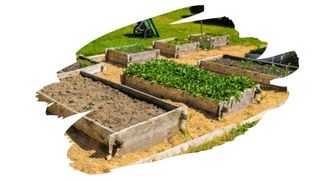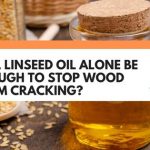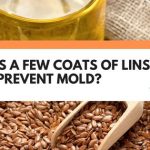The idea is simple enough. Outdoor wooden structures need a hard-wearing wood sealer to protect them from the elements. And, there’s a long list of wood finishes on the market that can do just that.
However, if you’re searching for an exterior wood sealer — that’s also non-toxic and plant-safe — then that list of options gets cut drastically.
But, is Boiled Linseed oil on that short list?
Well, in this post, we dive into what kinds of ingredients really go into making Boiled Linseed oil. And keep reading to find out which plant-safe wood sealer is the best one for your garden bed.

This post may contain affiliate links to products that we receive a commission for (at no additional cost to you). Learn more here.
What Is The Safest Wood Finish For A Raised Garden Bed?
The safest type of wood finish for a raised garden bed is none at all. Using untreated wood, and leaving that wood unfinished, removes the chance of any chemicals leaching into soil.
Now, untreated wood is simply natural wood that’s free of chemical wood preservatives. While treated wood has been ‘treated’ and infused with chemicals designed to help prevent wood rot.
But, the problem with using treated wood for a raised bed, is that the chemicals in these wood preservatives are pretty toxic. In fact, some of those wood preservatives, (such as Chromated copper arsenate), can even contain arsenic.
Having said that, treated wood will last much longer outside — especially in rainy and more humid climates — than untreated wood. And the same also goes for wood that’s been coated with a water-resistant wood finish.
But Won’t Leaving Wood Unfinished Mean That It’ll Rot Away Quickly?
It depends on the type of wood.
As a general rule of thumb, wood that’s exposed to a lot of moisture and humidity, will rot away quickly. But, there are certain types of wood that are naturally more adept to surviving humid conditions. These wood types can handle moisture well enough to stave off rot, making them ideal for outdoor structures.
So, rot-resistant timbers, such as Red Western Cedar and White Oak, are great choices for making a raised bed.
Related Post: Can You Really Use Untreated Oak For Raised Beds?
Now, having said all that, even a durable rot-resistant lumber will benefit from a weatherproofing finish. So, for a truly long lasting garden bed, you should apply some kind of wood sealer to protect it.
What About Boiled Linseed Oil? Is Boiled Linseed Oil A Good Exterior Wood Sealer?
First off, this wood finish can be applied on both interior and exterior wood. However, it’s not the most durable (nor most water-resistant) finish out there.
On frequently used wooden surfaces, a Boiled Linseed oil top coat can become worn down within months. Which is why this wood finish often needs a reapplication every 6-12 months.
And, while Boiled Linseed oil can shrug off water spills, it is not the most water-resistant top coat. And it is certainly no polyurethane when it comes to waterproofing.
Related Post: Can You Use Polyurethane On Tree Bark Decorations?
Is Boiled Linseed Oil At Least Somewhat Waterproof?
Boiled Linseed oil is not a waterproof finish. It is more of a water-repelling coat.
Boiled Linseed oil can reduce the amount of water that wood absorbs. However, it doesn’t stop all moisture from soaking down into wood grain.
This is the main reason why Boiled Linseed oil isn’t suitable for a raised garden bed — particularly as it won’t last much beyond a year in all-weather. But, this oils lack of durability as an outdoor sealer is the least of your concerns.
And why is that? Well, because the chemicals used to make Boiled Linseed oil aren’t the kind that you’d want to risk soaking into your garden soil.
Wait…I Thought Linseed Oil Was Natural. What Is Boiled Linseed Oil Made Of?
Well, Raw Linseed oil is a natural wood finish. This plant-sourced finish is extracted from flaxseed. And, in it’s purest form, Raw Linseed oil is non-toxic.
However, Boiled Linseed oil (BLO) is not a wholly natural oil. Instead, it is a fast-drying derivative of Raw Linseed oil.
You see, Boiled Linseed oil is created when Raw Linseed oil is put through a super-heated treatment. During this treatment, chemical dryers get added to the boiling oil (i.e. ‘Boiled’ Linseed oil).
And those chemical dryers — which include thinners and mineral spirits — are the reason why BLO drys so much faster than Raw Linseed oil.
Related Post: Walnut Oil Vs Linseed Oil For Wood (What You Really Need To Know)
So What Kind Of Wood Finish Can I Use On My Raised Vegetable Garden Bed?
Use a non-toxic exterior wood sealer, rather than Boiled Linseed oil.
A wood sealer will do a much better job at protecting and weatherproofing exterior lumber.
Which is why you should use ‘Seal It Garden Bed Wood Sealer’ for your raised bed.
This eco-friendly product is plant-safe and free of harmful chemicals. And it’s been specially formulated so that it bonds right onto wood. Which is why there’s little chance of it slipping off into soil.
What’s more, unlike Teak oil, this sealer doesn’t need frequent reapplications, since it can protect wood for over 10 years.
But, most importantly, it is a non-toxic sealer that’s free of solvents, metals, and sulphate’s. So you needn’t worry about those harmful chemicals getting into your vegetable garden soil.
You can check out the latest prices for this plant-safe wood sealer by popping on over to Amazon.
To Wrap Up, Here Are The 3 Key Takeaways From This Post…
- 1). Boiled Linseed oil is not a wholly natural finish. It is a toxic oil made up of a blend of Raw Linseed oil and chemical additives.
- 2). Boiled Linseed oil, when used on outdoor structures, will need to be reapplied yearly.
- 3). So instead, use a more durable non-toxic wood sealer to properly weatherproof your garden bed.
References:
Chromated copper arsenate–treated wood: A potential source of arsenic exposure and toxicity in dermatology | National Center for Biotechnology Information



